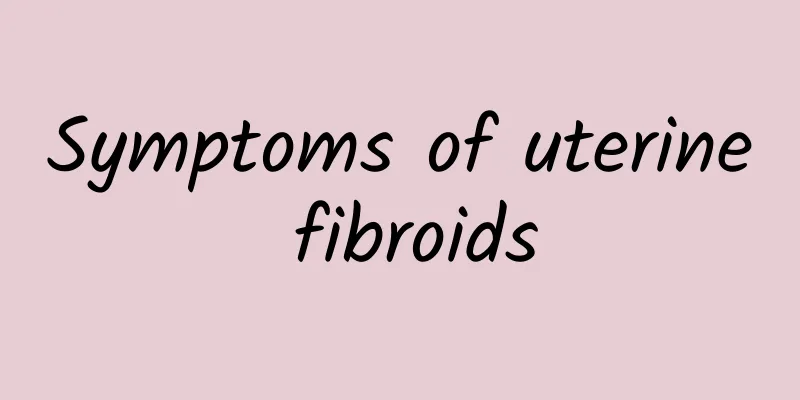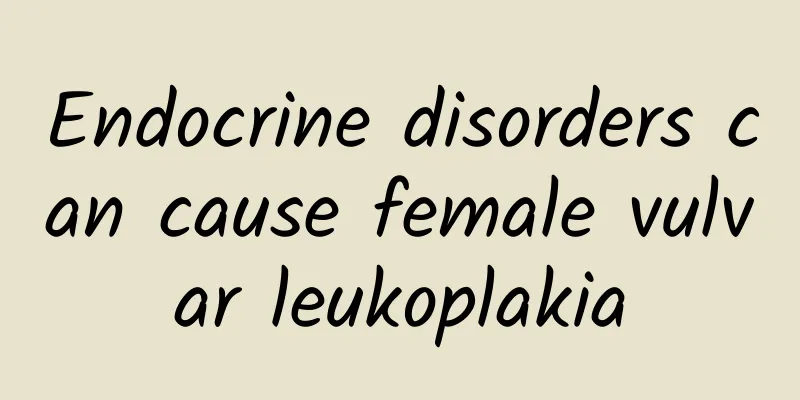Symptoms of uterine fibroids

|
What are the symptoms of uterine fibroids? Uterine fibroids are a type of female disease, and this disease is also a common disease. For this reason, we must take it seriously. We know that uterine fibroids are a benign tumor, and the causes of this disease are also different. For this reason, we must pay close attention to it. So, what are the symptoms of uterine fibroids? 1. Menstrual changes If your menstrual cycle changes, your menstrual blood volume increases, or your period is prolonged, you need to be alert. 2. Pain: Most patients with uterine fibroids do not feel pain, but a small number of people may experience lower abdominal pain after the fibroids become infected or the uterus becomes deformed. 3. Lumps can be felt in the lower abdomen, especially when the bladder is full of urine. The more painless and itchy lumps are, the more you should be wary of them. 4. Feeling of pressure. Most patients with uterine fibroids do not feel anything. However, if the fibroid is located low, even if the tumor is not large, it can compress adjacent organs. For example, if it compresses the bladder, urination difficulties may occur; if it compresses the rectum, defecation difficulties may occur; if it compresses the ureter, symptoms such as back pain may occur. 5. Infertility: A small number of patients with uterine fibroids may be infertile. The reason is that the fibroids cause the uterus to deform, making it difficult for the fertilized egg to implant. Experts say that if we don’t treat it well, it’s easy to cause unnecessary harm: The blood supply of uterine fibroids comes from the myometrium, and its blood vessel wall lacks an outer membrane. Compression of the capsule or pedicle can cause obstruction of the blood supply to the muscle. Liquefaction or cystic change: As the hyaline degeneration continues to develop, it gradually forms many small cavities of varying sizes from liquefaction, and even merges into a large cystic cavity. The cystic muscle is very soft, resembling a pregnant uterus. Uterine fibroids can cause pathological changes, so what is the incidence of uterine fibroids? The incidence of uterine fibroid degeneration is 0.13%-1.39%, mainly flesh degeneration. At this time, the uterus becomes soft and grows fast, often accompanied by irregular bleeding or excessive menstruation. |
<<: What symptoms can be used to preliminarily diagnose whether ovarian cysts affect menstruation?
>>: What is pelvic inflammatory disease
Recommend
Onions lower cholesterol and help lose weight! Nutritionist Li Wanping: Eat 6 onions a day to lose weight
Onion is a nutritious vegetable and also a good s...
What is menopause?
Menopause refers to the absence of menstruation w...
Is lower body fat better?
Lower body fat percentage does not necessarily me...
What are the symptoms of uterine fibroids?
The main symptoms of uterine fibroids include abn...
Is the third degree cervical erosion harmful? You must know the major hazards of the third degree cervical erosion
Among the common gynecological diseases in women,...
Introducing the common causes of ovarian cysts to female friends
Ovarian cysts are a gynecological disease that is...
Misconceptions about weight loss (I) Do you have to give up snacks to lose weight?
【Core Tip】: Is losing weight difficult? No! In fa...
careful! Eating rock salt and rose salt will cause iodine deficiency and obesity
Rich ladies love to eat imported rock salt, rose ...
What are the main causes of dysmenorrhea in women?
Many women can only bear the pain of dysmenorrhea...
Belly-baring outfits are popular in summer! Leg lifts to slim your belly
This summer, belly-revealing outfits are very pop...
What are the main early symptoms of ectopic pregnancy?
Ectopic pregnancy mainly refers to ectopic pregna...
What foods should not be eaten when you have uterine fibroids? What foods should not be eaten when you have uterine fibroids?
Uterine fibroids are a common gynecological disea...
Does cervical erosion need treatment?
Generally speaking, mild cervical erosion without...
Analysis: What are the causes of vulvar leukoplakia?
At present, medical knowledge says that vulvar le...
Can exercise treat cervical hypertrophy?
Cervical hypertrophy can be improved with the hel...









